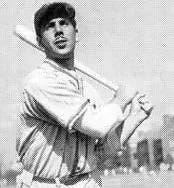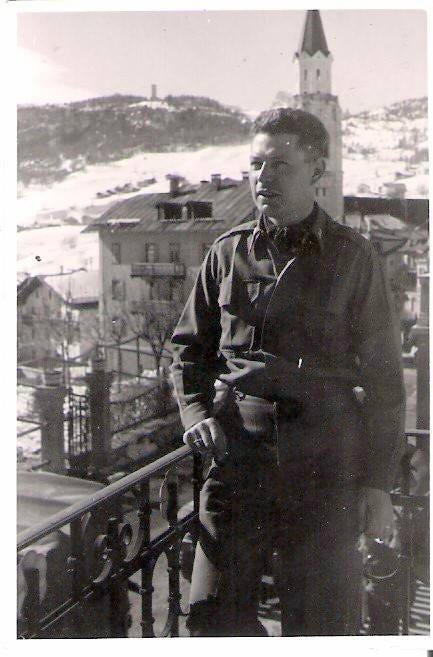WWII Baby Howard's Worth Was 12 Points
On the morning of May 2, 1945, there was a rumor of the possible German Surrender to be held at La Stanga, Italy (12 miles/19 km from Santa Giustina, where my dad’s 337th Infantry Regiment of the 85th Infantry Division of the Fifth Army received the rumor.)
One soldier yelled, “Do you have the Point System?” The echo roared over 2,500 soldiers. The baby-faced, exhausted serviceman pulled the Star and Stripes clipping out of his backpack.
The Point System was the short name of the Adjusted Service Rating Score. It was the system for calculating the eligibility of when a U.S. Soldier was allowed to go home.
My dad grabbed a notepaper and pencil and calculated how soon he might go home based on the Point System. He put the numbers on a paper with the following:
Service Credit: 39 points
Overseas Credit: 16
Combat Credit: 35 (Bronze Medal and six battle stars)
He said “90”, but his first lieutenant reminded him that “85” was for an enlisted man and “100” was for an officer.
Dad quickly looked at the number of points each child - “12.”
Parenthood: 12
He totaled it with 102 points.
Four months later, in September 1945, Dad came home and greeted his child (me) for the first time. At that time, I was one year and two months old.
[Note: I made up a story about my dad because he never told me, but the date, location, and score are accurate. ]
Most of my dad’s division soldiers, such as Staff Sergeant Roy E. Jones, Co. C, 337th Infantry Regiment, and Private Martin Alder, Co. D, 339th Infantry Regiment, were the lower point men transferred elsewhere.
Marvis Jones replied, “That's why Dad was transferred to the 88th. He didn't have enough to come home.” Rachelle Shelley Adler Donley exclaimed, “My dad was also transferred to the 88th. He was sure he would be on his way to the Pacific and was really upset about it,”
~~~~~~~~~~~~~~~~~~~~~~~~~~~~~~~~~~~~~~~~~~~~~~~~~~~~~
After the end of the war, Private First Class Seymour Sarokin, Co. D, 337th Infantry Regiment, got an order to be transferred to the 88th Division. Although he took basic training in January 1942, Sarokin was sent overseas in August 1944. The base commander in the USA caused the 4-month delay for him by keeping him playing baseball for their base’s team in the summer of 1944 since he was a star catcher for Brooklyn College and the 1939 batting champ in the New York City baseball league.
Without delay, he could earn 8 points for being overseas and at least five points for a battle star in Operation Diadem (also referred to as the Fourth Battle of Monte Cassino) in May 1944.
Again, his immediate transfer to the 88th Division was a severe blow to his 337th Regment and company commander (my dad) for not participating in the all-day Regiment Sports Games in Belluno, Italy, on June 22, 1945 - just four days before departing to Volturno Redeployment Area for Return to States (near Naples.)

The 12-company athletic competition was based on a company versus a company. Without Sarokin, my dad’s Company D did not win the overall championship, so Company H won it. After coming home on Christmas Day in 1945, Sarokin played Triple-A ball in the Chicago Cubs system for a while.
~~~~~~~~~~~~~~~~~~~~~~~~~~~~~~~~~~~~~~~~~~~~~~~~~~~~~
Being an Army career man, First Lieutenant John Freeman Co. K, 377th Infantry Regiment, was ordered to transfer to Cortina d'Ampezzo, Italy, to occupy this ski town militarily as a military mayor for a while.
Touring this village with me in 2019, John’s son Mike told me, “ So you wonder where I got my love of skiing? From my Dad, of course! He learned to ski in Cortina d'Ampezzo, Italy, the winter after victory in Europe. He remained in Italy for 18 months to ensure Marshall Tito and the communists were well-behaved. He was reassigned to the Corps of Engineers to rebuild bridges, water supplies, railroads, and other infrastructure projects. “
~~~~~~~~~~~~~~~~~~~~~~~~~~~~~~~~~~~~~~~~~~~~~~~
The 2020 article of the National WWII Museum mentions:
“The childless soldiers complained that if they had been stateside in the past two or three years, they may have become fathers too. Private Walter Anderson wrote to his wife, “I only have 28 points, so there isn’t much chance of me getting home. We should of [sic] had about three kids.” He jokingly added, “We will know better next time.”
~~~~~~~~~~~~~~~~~~~~~~~~~~~~~~~~~~~~~~~~~~~~~~~~~~~~~
In the “Band of Brothers,” Maj. Richard D. Winters (pictured) announced to his Easy Company men, “This morning, President Truman received the unconditional surrender from the Japanese. THE WAR IS OVER. Regardless of points, medals, or wounds, each man in the 101st Airborne would go home.”)
This confused me because the point system had continued beyond the Japanese surrender but lowered from 85 to 50 points by the end of 1945.
In June 1946, the US Army decided to end the point system with a new order to discharge all soldiers after they had completed two years of service.
Question: Was I “a wonderful little twelve-point rascal”?
LINK LIST:
The Points System: or Advanced Service Rating Score (custermen.com)
WWII Points – Adjusted Service Rating Score (ASRS) (WWII Dog Tag website)
The Points Were All That Mattered: The US Army’s Demobilization After World War I (National WW2 Museum)






